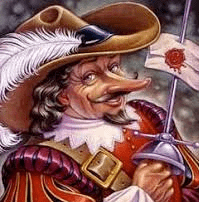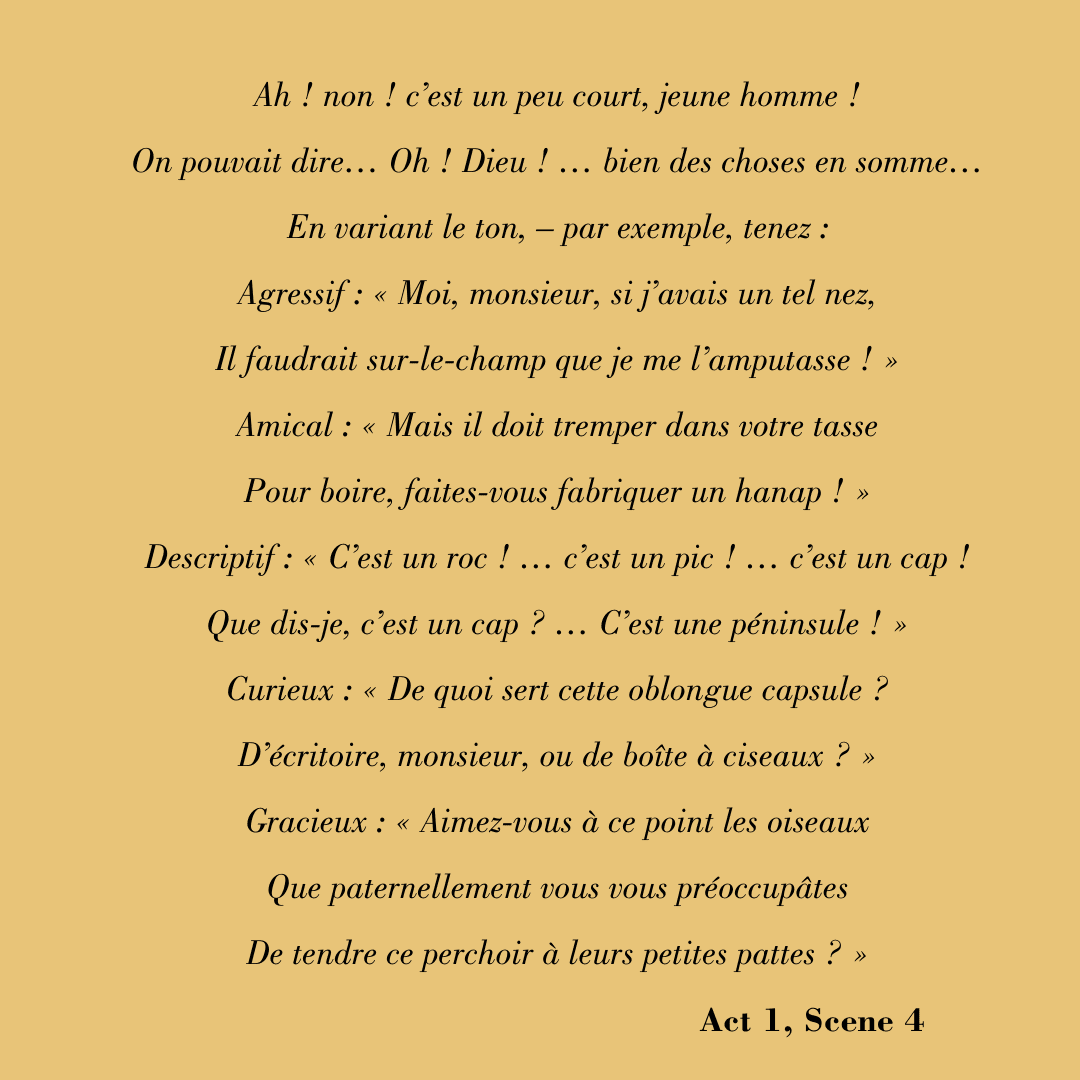Edmond Rostand, the Cyrano of the Basque Country
"It's a rock! ... It's a cape! ... What am I saying? It's a pinnacle!" We all know this famous line from the play
Cyrano de Bergerac, but have you heard of his author? We tell you all about Edmond Rostand, 19th century playwright and poet, and father of
the famous Cyrano!
It all started in Marseille...
.png) Edmond Rostand is a French writer, playwright, poet, and essayist born in 1868. He is a native of the Marseille region, moved to Paris,
then lived several years and spent his last days in the Basque country. Initially intended for a career as a lawyer, he rebelled
against his parents. He composed in 1889 at the age of 21 his first successful work, the collection of poems Les Pipeaux, which
won the Academy Prize. A difficult start however, his success was slow in coming: several projects were postponed or aborted due to lack of
interest and therefore lack of funding. His career really started in 1897 with La Samaritaine, an episode from the Gospel of
John. This is probably the play where Rostand's thought tend most towards the ideal. This choice of writing will classify him among the
romantic authors of his time and determine his fame. His most famous works will be his plays, especially Les Romanesques,
(1894) or L'Aiglon, (1900).
Edmond Rostand is a French writer, playwright, poet, and essayist born in 1868. He is a native of the Marseille region, moved to Paris,
then lived several years and spent his last days in the Basque country. Initially intended for a career as a lawyer, he rebelled
against his parents. He composed in 1889 at the age of 21 his first successful work, the collection of poems Les Pipeaux, which
won the Academy Prize. A difficult start however, his success was slow in coming: several projects were postponed or aborted due to lack of
interest and therefore lack of funding. His career really started in 1897 with La Samaritaine, an episode from the Gospel of
John. This is probably the play where Rostand's thought tend most towards the ideal. This choice of writing will classify him among the
romantic authors of his time and determine his fame. His most famous works will be his plays, especially Les Romanesques,
(1894) or L'Aiglon, (1900).
A pioneer of French romanticism
Although the literary landscape of the late XIXth century is very diverse, it signs yet the end of the symbolist current, and the
return of romantic realism with the work of Edmond Rostand.
If symbolism grants a great importance to the dreams, to the interpretations of the reality, romanticism on the other hand returns to
fundamental values such as the heart, the individuality, the nature. These values were all the more sought after in the French context,
which was then in the midst of a technological and urban revolution. Money became more and more predominant and created a feeling of
disillusionment that was popularized by the expression "Le mal du siècle". The expression will be also taken by
authors such as Diderot, Stendhal, or Rousseau.
Edmond Rostand, the father of Cyrano de Bergerac
In full accordance with his vision of the world, Edmond Rostand composed Cyrano de Bergerac, a play freely
 inspired
by the libertine writer Savinien de Cyrano de Bergerac (1619-1655). First performed in 1897, the work follows both the format of
"vaudeville" (a particularly light and bawdy comic theater typical of France) and the romantic values emerging at the time. The
play is a dramatic comedy, written in verse, which tells the story of Cyrano de Bergerac, in love with his cousin Roxane. She confesses to
him that she loves Christian de Neuvillette, a new cadet whom she makes him promise to protect.
inspired
by the libertine writer Savinien de Cyrano de Bergerac (1619-1655). First performed in 1897, the work follows both the format of
"vaudeville" (a particularly light and bawdy comic theater typical of France) and the romantic values emerging at the time. The
play is a dramatic comedy, written in verse, which tells the story of Cyrano de Bergerac, in love with his cousin Roxane. She confesses to
him that she loves Christian de Neuvillette, a new cadet whom she makes him promise to protect.
Aware of his lack of wit, Christian also gets Cyrano to write his love letters to the beautiful Roxane for him. The story of this love
triangle and the internal intrigues make the success of the work.
The play was translated into many languages, travels around the world and the character of Cyrano becomes a patriotic symbol in all
countries where it is staged.
Cyrano symbolizes the love of his country, not the hatred of others. So there can
be a Japanese Cyrano as well as a Polish Cyrano, a French Cyrano as well as a German Cyrano... It must be said that the French political
situation was gloomy at the time: France had lost the battle of Sedan in 1870 against Prussia, and conflicts between anarchists and
republicans were tearing the country apart. The people demanded entertainment as much as commitment from the artists. Edmond Rostand will
be decorated with the Legion of Honor after the first performance of the play, and Cyrano de Bergerac is adapted into books
and films until now.

A committed author
The Dreyfus Affair, named after the Jewish French officer convicted of treason two years earlier, was on the front pages of newspapers and
at the dinner table of every family. Rostand will be" Dreyfusard," all his life, even after the success of Cyrano and L'Aiglon,
which are recovered by the supporters of French nationalism. Whoever reads L'Aiglon, but also Chantecler where his
hero is a Gallic rooster, understands that Rostand loves his country with passion, and is patriotic, but that he is deeply humanist
and peaceful. That is why he did everything to suport the French soldiers when the First World War came even though as a typical
French bourgeois he did not share their socialist opinions.
In 1902, after the success of L'Aiglon and Cyrano, he moved to the Basque Country, where he died in 1918 at the age of 50. Married to
Rosemonde Etienne, he had two sons: Maurice, in 1891, who became a poet and playwright like his father, then in 1894, Jean, philosopher and
biologist, academician in 1959.
Design by Monsieur Graphic
